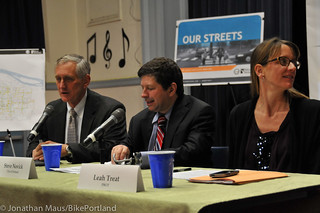Tomorrow, Portland’s city council is expected to approve a project (item 234) that’s likely to chart the city’s shift to “Vision Zero,” the philosophy that nothing — not vehicle speed, not road capacity, not even economic productivity — is more important to the transportation system than preventing the serious injury or death of a person on the road.
It’s a provocative idea. But what exactly does it mean the city would do that it doesn’t already do today?
The city’s plan isn’t written yet. Local consultants for Nelson\Nygaard won the contract of to write the plan, which is part of a larger two-year, $150,000 strategic work plan for the transportation bureau. PBOT Spokesman Dylan Rivera said Monday that the work plan would be written by fall.
But a look at the plan recently announced in New York City suggests some possibilities. Here’s a list of the specific promises announced by incoming Mayor Bill de Blasio in January, as recorded by the video above.
1) Stiffer punishments for people who kill people while breaking traffic laws.
2) Lobbying the state for the right to install speed cameras wherever the city wants, without state permission, and to start issuing tickets for violators.
3) Boosting police traffic investigations to include critical injuries as well as probably fatalities, a 20 percent increase in caseload.
4) A 33 percent increase in the police department’s traffic crash investigation staff.
5) An inter-agency working group with a one-month deadline to submit:
-
5a) a plan to dedicate more police time to enforcing speed limits and proper yielding at intersections, plus
5b) the names of 50 different intersections to be improved within the next year.
If you know much about how local government works, you might have already noticed something about this list: every single item includes an agency that in Portland is not controlled by the transportation director: the police department.

Steve Novick and Transportation Director Leah Treat.
(Photo by J.Maus/BikePortland)
In the case of item 2, Oregon’s legislature would also need to get involved. Last year, the Bicycle Transportation Alliance unsuccessfully pushed for the state to allow police officers to issue tickets using information from unmanned traffic safety cameras on high-crash corridors. It’s considering another such effort in 2015.
“I’d be thrilled to see the city re-engage on this issue and push for more traffic safety cameras on our high-crash corridors,” BTA Advocacy Director Gerik Kransky wrote in an email. “It is time for this to happen.”
Will this and other changes to police practices be on the table in Portland? It’s not out of the question, since the man who oversees the Portland Police Bureau, Mayor Charlie Hales, endorsed Vision Zero at a campaign event, according to BTA Executive Director Rob Sadowsky (who said he’d asked Hales the question himself).
Sadowsky said last month that he isn’t sure “that we have the political will or, I don’t know, the chutzpah, to take some of the steps on the enforcement side.” But he said enforcement would be necessary for Vision Zero to fulfill its promise.
Mayor Hales’ office didn’t respond to two emails last month asking about the mayor’s take on Vision Zero.
In the video above, New York City Police Commissioner Bill Bratton speaks for almost as long as Mayor de Blasio, detailing his department’s commitment to his mayor’s agenda.
“A life lost is a life lost, whether by murder or by traffic accident,” Bratton said.

